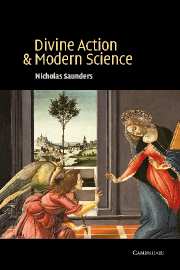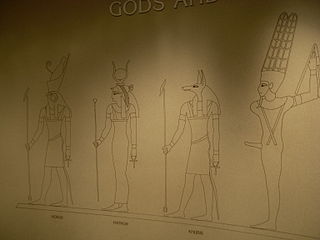Related Research Articles
Materialism is a form of philosophical monism which holds matter to be the fundamental substance in nature, and all things, including mental states and consciousness, are results of material interactions of material things. According to philosophical materialism, mind and consciousness are by-products or epiphenomena of material processes, without which they cannot exist. This concept directly contrasts with idealism, where mind and consciousness are first-order realities to which matter is dependent while material interactions are secondary.

The relationship between religion and science involves discussions that interconnect the study of the natural world, history, philosophy, and theology. Even though the ancient and medieval worlds did not have conceptions resembling the modern understandings of "science" or of "religion", certain elements of modern ideas on the subject recur throughout history. The pair-structured phrases "religion and science" and "science and religion" first emerged in the literature during the 19th century. This coincided with the refining of "science" and of "religion" as distinct concepts in the preceding few centuries—partly due to professionalization of the sciences, the Protestant Reformation, colonization, and globalization. Since then the relationship between science and religion has been characterized in terms of "conflict", "harmony", "complexity", and "mutual independence", among others.
Dialectic, also known as the dialectical method, is a discourse between two or more people holding different points of view about a subject but wishing to establish the truth through reasoned argumentation. Dialectic resembles debate, but the concept excludes subjective elements such as emotional appeal and rhetoric. Dialectic may thus be contrasted with both the eristic, which refers to argument that aims to successfully dispute another's argument, and the didactic method, wherein one side of the conversation teaches the other. Dialectic is alternatively known as minor logic, as opposed to major logic or critique.

Debiprasad Chattopadhyaya was an Indian Marxist philosopher. He made contributions to the exploration of the materialist current in ancient Indian philosophy. He is known for Lokayata: A Study in Ancient Indian Materialism, which is his exposition of the philosophy of Lokayata. He is also known for work on history of science and scientific method in ancient India, especially his 1977 book Science and Society in Ancient India on the ancient physicians Charaka and Sushruta. He was awarded the Padma Bhushan, India's third highest civilian honour, posthumously, in 1998.

John F. Haught is an American theologian. He is a Distinguished Research Professor at Georgetown University. He specializes in Roman Catholic systematic theology, with a particular interest in issues pertaining to physical cosmology, evolutionary biology, geology, and Christianity.
Metaphysical naturalism is a philosophical worldview which holds that there is nothing but natural elements, principles, and relations of the kind studied by the natural sciences. Methodological naturalism is a philosophical basis for science, for which metaphysical naturalism provides only one possible ontological foundation. Broadly, the corresponding theological perspective is religious naturalism or spiritual naturalism. More specifically, metaphysical naturalism rejects the supernatural concepts and explanations that are part of many religions.
Nancey Murphy is an American philosopher and theologian who is Professor of Christian Philosophy at Fuller Theological Seminary, Pasadena, CA. She received the B.A. from Creighton University in 1973, the Ph.D. from University of California, Berkeley in 1980, and the Th.D. from the Graduate Theological Union (theology) in 1987.

Materialism and Empirio-criticism is a philosophical work by Vladimir Lenin, published in 1909. It was an obligatory subject of study in all institutions of higher education in the Soviet Union, as a seminal work of dialectical materialism, a part of the curriculum called "Marxist–Leninist Philosophy". Lenin argued that human perceptions correctly and accurately reflect an objective external world.

Divine Action and Modern Science (2002) is a book written by Nicholas Saunders. It looks at Near Eastern biblical and modern theological approaches to the idea of divine action, covering such questions as how divine action occurs, what its effects are, the relationship between divine and finite causation and complementarity versus mutual exclusivity. Saunders concludes that God is active in the physical world, but not as described by traditional accounts.

Polytheism is the belief in multiple deities, which are usually assembled into a pantheon of gods and goddesses, along with their own religious sects and rituals. Polytheism is a type of theism. Within theism, it contrasts with monotheism, the belief in a singular God who is, in most cases, transcendent. In religions that accept polytheism, the different gods and goddesses may be representations of forces of nature or ancestral principles; they can be viewed either as autonomous or as aspects or emanations of a creator deity or transcendental absolute principle, which manifests immanently in nature. Polytheists do not always worship all the gods equally; they can be henotheists, specializing in the worship of one particular deity, or kathenotheists, worshiping different deities at different times.
Peter W. Ochs is the Edgar M. Bronfman Professor of Modern Judaic Studies at the University of Virginia, where he has served since 1997. He is an influential thinker whose interests include Jewish philosophy and theology, modern and postmodern philosophical theology, pragmatism, and semiotics. Ochs coined the term "scriptural reasoning" and is the co-founder of the Society for Scriptural Reasoning, which promotes interfaith dialog among Christians, Jews, and Muslims through scriptural study groups. He is also a co-founder of the Children of Abraham Institute, which promotes interfaith study and dialog among members of the Abrahamic religions.

Donald Allen Crosby is an American theologian who is Professor Emeritus of Philosophy at Colorado State University, since January 2000. Crosby's interests focus on metaphysics, American pragmatism, philosophy of nature, existentialism, and philosophy of religion. He is a member of the Highlands Institute of American Religious and Philosophical Thought (HAIRPT) and has been a leader in the discussions on Religious Naturalism.
This is a list of articles in philosophy of religion.
Stephen Matthew Barr is an American physicist who is a professor emeritus of physics at the University of Delaware. A member of its Bartol Research Institute, Barr does research in theoretical particle physics and cosmology. In 2011, he was elected Fellow of the American Physical Society, the citation reading "for original contributions to grand unified theories, CP violation, and baryogenesis."

The Blackwell Companion to Science and Christianity is a reference work in science and religion, edited by J.B. Stump and Alan G. Padgett, and published by Wiley-Blackwell in 2012. It contains 54 new essays written by an international list of 55 authors, many of them leading scholars in the discipline of science and religion, and others new or up-and-coming voices in the field. The editors claim, "We are seeking to introduce and advance serious thinking and talking about science and Christianity, particularly as they interconnect. We are reflecting on the work of scientists and theologians, trying to find points of contact and points of tension which help to illuminate these practices and doctrines in clear, scholarly light." The book has received positive reviews in Choice, Reference Reviews, Themelios and Perspectives on Science and Christian Faith. The article by Sean M. Carroll generated significant attention when it was discussed on the Huffington Post.
Dialectical materialism is a materialist theory based upon the writings of Karl Marx and Friedrich Engels that has found widespread applications in a variety of philosophical disciplines ranging from philosophy of history to philosophy of science. As a materialist philosophy, Marxist dialectics emphasizes the importance of real-world conditions and the presence of functional contradictions within and among social relations, which derive from, but are not limited to the contradictions that occur in social class, labour economics, and socioeconomic interactions.
Kelli D. Potter is an American philosopher and associate professor of philosophy at Utah Valley University. Her areas of expertise include: philosophy of religion, Mormon studies, philosophy of gender, and philosophy of logic. Potter was a founding board member of the Society for Mormon Philosophy and Theology and founding editor of Element: The Journal for the Society for Mormon Philosophy and Theology, serving from 2000–2002. Potter also served on the editorial board of Dialogue: A Journal of Mormon Thought from 1999–2003.
References
- ↑
- James F. Salmon. Theological Studies March 2005 v66 i1 p207-209
- ↑ "Modern Physics and Ancient Faith // Books // University of Notre Dame Press". undpress.nd.edu. Archived from the original on 2009-02-10.
- ↑ Stephen P. Weldon. Isis, December 2004, volume 95 issue 4, p. 742-743